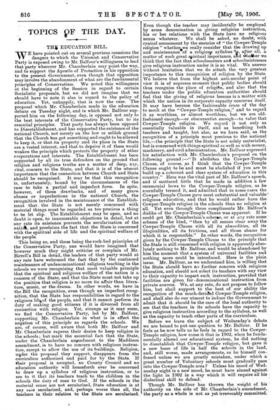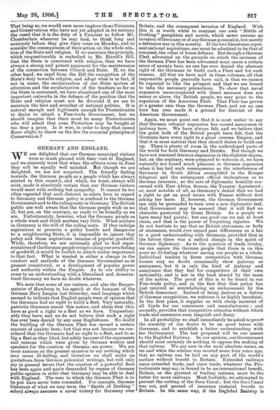TOPICS pF THE DAY.
TH4 EDUCATION BILL.
WE have pointed out on several previous occasions the dangers to which the Unionist and Conservative Party is exposed owing to Mr. Balfour's willingness to lead that party wherever Mr. Chamberlain may point the way, and to support the Apostle of Protection in his opposition to the present Government, even though that opposition may involve the abandonment of what are the fundamental principles of Conservatism. We noted this willingness at the beginning of the Session in regard to certain Socialistic proposals, but we did not imagine that we should have to note it also in regard to the' policy of education. Yet, unhappily, that is now the case. The proposal which Mr. Chamberlain made in the education debate on Tuesday night, and in which Mr. Balfour sup- ported him on the following day, is opposed not only to the best interests of the Conservative Party, but to its essential principles. That party has always been opposed to Disestablishment, and has supported the existence of the national Church, not merely on the low or selfish ground that the Church has got something and ought to be allowed to keep it, or that its property and its place in the State are a vested interest, and that to deprive it of them would weaken the principle which protects the property of other corporations and interests. The Establishment has been supported by all its true defenders on the ground that religion and religious truths are a matter of deep, nay, vital, concern to the State, and that it is of the utmost importance that the connection between Church and State should be recognised. It may be that this recognition. is, unfortunately, bound by the circumstances of the case to take a partial and imperfect form. In spite, however, of these drawbacks, and of many grave abuses or imperfections in the national Church, the recognition involved in the maintenance of the Establish- ment that . the State is not merely concerned with material things must be regarded as too precious a thing to be let slip. The Establishment may be open, and no doubt is open, to innumerable objections in detail, but at any rate its existence prevents the secularisation of the natia, and proclaims the fact that the State is 'concerned with the spiritual side of life and the spiritual welfare of the people.
This being so, and these being the rock-bed principles of the Conservative Party, one would have imagined that however much they might criticise or complain of Mr. Birrell's Bill in detail, the leaders of that party would at any rate have welcomed the fact that by the continued maintenance of undenominational religious teaching in the schools we were recognising that most valuable principle that the spiritual and religious welfare of the nation is a concern of the State, and that the State must not take up the position that religion is no more its affair than litera- ture, music, or the drama. In other words, we have in the Bill the recognition, even though an imperfect recog- nition, that the State has responsibilities in regard to the religious lif%of the people, and that it cannot perform its duty of making good citizens if it is divorced from all connection with religion. Yet, strange as it may seem, we find. the Conservative Party, led by Mr. Balfour, supporting Mr. Chamberlain in what is in effect the negation of this principle as regards the' schools. We are, of course, well aware that both Mr. Balfour and Mr. Chamberlain express their desire to keep religion in the schools ; but mark the essential fact that the State, under the Chamberlain amendment to the Maddison amendment, is to have no concern with religious instruc- tion, except to allow the use of its buildings. Religion, ceder the proposal they support, disappears from the curriculum authorised and paid for by the State. If their proposal is accepted, no County Council and no education authority will henceforth ever be concerned to draw up a syllabus of religious instruction, or to see to it that its teachers teach to the children in the schools the duty of man to God. If the schools in the material sense are not secularised, State education is at any tai.e secularised, and, perhaps worse than all, the teachers in their relation to the State are secularised. Even though the teacher may incidentally be employed. by some denomination in giving religious instruction, his or her relations with the State have no religious nexus whatever. We shall be asked, no doubt, with cynical amusement by the enemies of " the Cowper-Temple religion" whetherwe really consider that the drawing up and maintenance of a religious syllabus IF, after all, a matter of such great spiritual importance, Ad N;liekher we think that the fact that schoolmasters and schoolmistresses give 'religious instruction under it is so vital. We answer without hesitation that we do attach tho very greatest importance to this recognition of religion by the State.
We believe that from the highest anti-secular point of view it is of supreme moment that public bodies should thus recognise the place of religign, and also that the teachers under the public education authorities should feel that the giving of religious lessons is a matter with which the nation in its corporate capacity concerns itself. It may have become the fashionable craze of the day to mock at the " Cowper-Temple religion," and to regard it as worthless, or almost worthless, but we are old- fashioned enough—or obscurantist enough—to value that Cowper-Temple religion. We regard it not only as essentially valuable in itself, and as benefiting both teachers' and taught, but also, as we have said, as the recognition of a principle most precious to the national life,—the principle that the State is not solely materialist, but is concerned with things spiritual as well as with money, machinery, and civil administration. Mr. Balfour expressed his satisfaction with Mr. Chamberlain's proposal on the following ground :—" It abolishes the Cowper-Temple Clause, of course, as I think that the Cowper-Temple Clause ought to be.and must be abolished if you are to build up a coherent and clear system of education in this country. ' Here was the vital part. of Mr. Balfour's speech, and it mattered little that he made in addition a few ceremonial bows to the Cowper-Temple religion, as he scornfully termed it, and admitted that in some cases the Cowper-Temple Clause gave most substantial and valuable' religious education, and that he would rather have the. Cowper-Temple religion in the schools than no religion at all. Yet even through these compliments Mr. Balfour' dislike of the Cowper-Temple Clause was apparent. If he could get Mr. Chamberlain's schense, or at any rate some' scheme of the kind, " then by' all means clear away the Cowper-Temple Clause with all its absurdities, all its' illogicalities, all its frictions, and all those shams for which it is responsible." In other words, the recognition given by the Cowper-Temple Clause to the principle that the State is still concerned with religion is apparently abso- lutely nothing to Mr. Balfour, and would be abandoned by him the moment that a system of universal facilities and nothing more could be introduced. Here is the plain issue. Mr. Balfour, as we understand him, is willing that the State should have no further concern with religious education, and should not select its teachers with any view to their capacity to impart such instruction, provided that facilities are given for 'denominational instruction from private sources. We, at any rate, do not propose to follow him, but shall support to the best of our ability the recognition of the much-derided Cowper-Temple religion, and shall also do our utmost to induce the Government to admit that it . should be the care of the local authority to see that the teachers in its schools have the capacity to give religious instruction according to the syllabus, as well as the capacity to teach other parts of the curriculum.
Before we leave the subject of Wednesday's debate we are bound. to put one question to Mr. Balfour. If he feels as he now tells us he feels in regard to the Cowper- Temple religion, how came it that in 1902, when he funda- mentally altered our educational system, he did nothing to disestablish that Cowper-Temple religion, but gave it a new lease of life in half the schools in the land, and, still worse, made arrangements, as he himself con- fessed unless we are greatly mistaken, under which a great number of Voluntary schools must gradually pass into the Cowper-Temple area ? Unless his mood of Wed- nesday night is a new mood, he must have sinned against the light in 1902 in a way which it will require all his dialectical skill to defend.'
Though Mr. Balfour has thrown the weight of his ' authority on the side of Mr. Chamberlain's amendment, the party as 'a whole is not as yet irrevocably committed. That being so, we would once more implore those Unionists and Conservatives who have not yet adopted in its entirety the creed that it is the duty of a Unionist to follow Mr. Chamberlain wherever he may lead, to think long and anxiously before they give their votes on Monday, and to consider the consequences of their action on the whole rela- tion of the State and religion. If we maintain the principle, which unquestionably is embodied in Mr. Birrell's Bill, that the State is concerned with religion, then we have always a strong and potent argument for the maintenance of the connection between Church and State. If, on the other hand, we expel from the Bill the recognition of the State's duty towards religion, and adopt what is in fact, if not in name, the secularisation of our State system of education and the secularisation of the teachers as far as the State is concerned, we have abandoned one of the most important outworks in the defence of the position that the State and religion must not be divorced if we are to maintain the best and soundest of national polities. It is natural enough and legitimate enough for Protectionists to desire to attack a Free-trade Government, but we should imagine that there must be many Protectionists who will admit that even Protection may be bought at too dear a price. Is it wise, in order to keep that sacred flame alight, to throw on the fire the essential principles of Conservatism ?











































 Previous page
Previous page